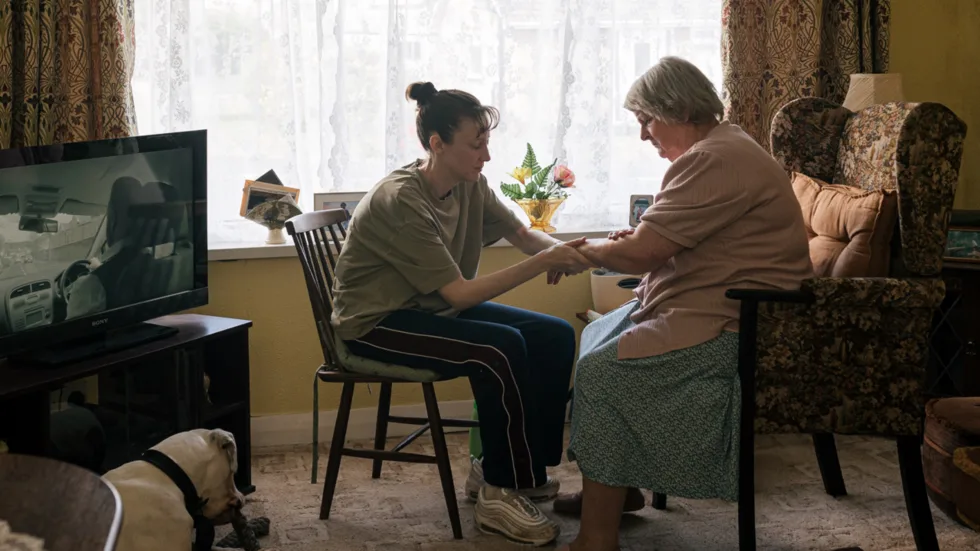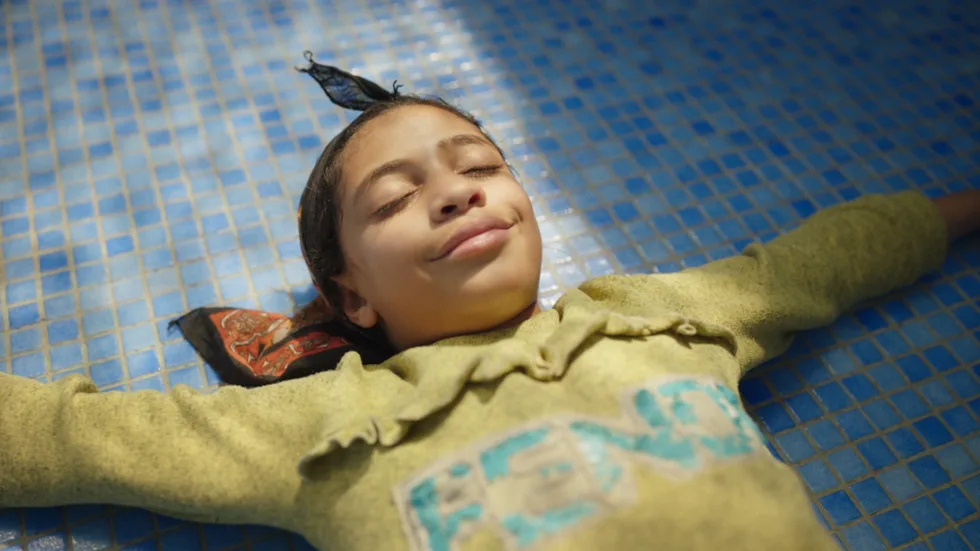Although the documentary section of this year’s Tribeca Film Festival often seemed to dominate the proceedings, there were a number of notable narrative items as well and one of them even turned to be one of the big award winners as well.
In the International Narrative section, the top prize went to “Happy Birthday,” Sarah Goher’s debut film about an eight-year-old girl named Toha (Doha Ramadan in a fantastic performance) who works as a maid for a wealthy family in Cairo and who is best friends with her employer’s young daughter, Nelly. On the occasion of Nelly’s birthday, Toha is determined to ensure that she has the best celebration imaginable—in part because she has never celebrated her own—and as the day goes on, her optimism and exuberance inevitably run smack into the social hierarchies that continue to dominate contemporary Egypt. This may sound like the makings of an especially mawkish melodrama. Still, it manages to avoid that with a thoughtful screenplay by Goher and Mohamed Diab (which also won the Best Screenplay prize) that tackles the issues at hand without milking the material for overt sentiment.
The U.S. Narrative Feature prize went to Libby Ewing’s “Charliebird,” which also won Best Performance for Gabriela Ochoa Perez, with the Special Jury Mention going to “Esta Isla,” Cristian Carretero and Lorraine Jones Molina’s beautifully filmed (it also won the award for Best Cinematography) but dramatically inert tale of a couple of young lovers who go on the run after one runs afoul of drug dealers and hide out in isolation in the mountains. Best Screenplay went to “On a String,” a very funny and incisive debut feature from writer-director-star Isabel Hagen about a Juilliard-trained violinist who is still struggling to make it by giving lessons and playing as part of a quartet for people far more successful than her. (At one point, she is taking a break from playing and is mistaken for one of the caterers.) Although I suspect that many of the reviews to come will employ some variation of the phrase “Gerwig-esque,” Hagen demonstrates genuine wit on both sides of the camera.

The Best Performance prize went jointly to Andrea Riseborough and Brenda Blethyn for their work in “Dragonfly,” writer-director Paul Andrew Williams’ film about a woman (Riseborough) who gets so infuriated with the slipshod care her elderly neighbor (Blethyn) is receiving from nurses hired by her son (mainly as an excuse not to visit her) that she offers to help out with the shopping and other chores for free. A friendship develops between the two, but as things progress, there are indications that there may be more to the woman’s motives than she is letting on. Without going into detail, what starts as a quietly biting critique along the lines of the films of Mike Leigh for the first two-thirds goes into some very different waters in the final stretch. While some may object to that turn, the performances from the two actresses are so good that they make it work against all odds.
As for the other films in the narrative section, several of them seemed crafted to remind viewers of earlier works, although they never quite lived up to those sources of inspiration. For example, the largely tedious “Paradise Records,” tells the story of the beleaguered owner of a failing record shop (musician Logic, who also wrote and directed) who, over the course of one long day, deals with his weirdo co-workers and clientele, the imminent loss of his business and a hostage situation and is so clumsily derivative of “Clerks” that when Jay & Silent Bob (Jason Mewes and Kevin Smth, the latter serving as an executive producer) turn up for a brief appearance, it seems more inevitable than surprising.
Rick Gomez’s “She Dances” tries to recapture the success of “Little Miss Sunshine” with a story of a father (Steve Zahn, who also co-wrote the screenplay) and his somewhat estranged daughter (Audrey Zahn, his real-life daughter) attempting to reconcile with each other and a shared tragedy when he is pressed into service at the last moment to chaperone her and her best friend (Mackenzie Ziegler) to a dance competition in a work that tries way too hard to be heartfelt and poignant. However, it does have the benefit of a strong and promising performance from the younger Zahn.

Rather than taking its inspiration from any single film, Melody C. Roscher’s “Bird in Hand” seems to be paying homage to any number of indie films that Miramax dumped onto the market during the ’90s. In this one, a quirky young biracial woman named Bird (Alisha Wainwright) visits her quirky estranged mom (Christine Lahti) with news of her impending wedding. As it turns out, however, she has an entirely different goal that she is hoping to accomplish in the quirkiest way imaginable. If that weren’t enough, she also becomes involved with her mom’s quirky neighbors (James Le Gros and Annabelle Dexter-Jones). None of the characters are particularly involving (Lahti is particularly wasted), and the result is more annoying than endearing.
However, I would certainly take it over the likes of Laurent Slama’s “Second Life,” a film clearly wanting to be the next “Before Sunrise.” It follows a suicidal young woman (Agatha Rouselle) working at a dead-end job showing clients to their apartment rentals for the Paris Olympic Games when she meets an aggressive free spirit (Alex Lawther) who is determined to bring joy to her existence even while masking his own sadness. Without beating a dead horse (one of the many activities preferable to sitting through this thing), I will merely state that this is a movie shot in Paris that features Rouselle, the knockout star of “Titane,” and is only 77 minutes long. Even with all that, I struggled to make it to the end.
While the narrative titles mentioned so far have come from emerging filmmakers, there were also a few titles from more established names. One of the more high-profile examples was “Gonzo Girl,” the directorial debut from Patricia Arquette that finds her adapting Cheryl Della Pietra’s novel inspired by her time working as a writing assistant to the legendary journalist Hunter S. Thompson in the early 90s. As the ersatz HST, known here as Walker Reade, Willem Dafoe is clearly having a good time (though his impersonation is not nearly as convincing previous attempts by Bill Murray and Johnny Depp). Still, as the assistant who gets caught up in his world of booze, guns, drugs and competing with his legacy, Camila Morrone is stuck with a role that rarely gives her any moments to shine. Essentially, Arquette (who also appears as Reade’s world-weary right-hand woman) has taken a story about someone struggling to avoid coming across as a side character in their own story and turned it into a story in which he ends up doing just that.

More interesting are the returns of two filmmakers who have been absent from the big screen for a while. Along with co-director David Merriman, Jim Sheridan returned with “Re-Creation,” an intriguing hybrid of documentary and fiction to reexamine the real-life 1996 murder of French filmmaker Sophie Toscan Du Plantier at her vacation home in Ireland—although British journalist Ian Bailey was tried and convicted in absentia in France, he never faced trial in Ireland and the case remains technically unsolved.
Using “12 Angry Men” as its obvious inspiration, Sheridan and Merriman speculate what might have occurred if Bailey had gone to trial in Ireland by focusing on a fictional jury (including Sheridan himself as the foreperson and Vicky Krieps as the one initial holdout) as they debate the facts and inconsistencies of the case while tempers flare among them. Although the film will likely resonate more with viewers in Europe than in America, the points that Sheridan and Merriman strive to make about the importance of facts in the face of emotion and sensationalism still come through with powerful effect.
“Relay,” the new film from David Mackenzie (“Hell or High Water”), is also a throwback of sorts, to the kind of smart, mid-budget adult-oriented thriller that Hollywood used to have no problem making once upon a time. In it, Riz Ahmed plays Ash, a recluse who makes his living helping to protect corporate whistleblowers from threats from their former employers by negotiating settlements between them (for a healthy fee), utilizing an impossible-to-trace phone-to-text relay service as his form of communication.
One day, he is approached by a scientist (Lily James) who stole incriminating files from her former employer and, having changed her mind, wants to use Ash’s services to negotiate their return while her former employer’s goons (led by Sam Worthington and Willa Fitzgerald) try to track her down. It’s a crisply made and very effective thriller that builds upon its intriguing hook with a script that provides numerous inspired twists and turns. There are fully developed characters for the cast to play—Ahmed and James develop a convincing relationship despite hardly ever appearing in the same frame—and exciting moments that make effective use of the New York locations.

As “Queens of the Dead,” the raucous debut of director/co-writer Tina Romero, begins, a warehouse party catering to the Brooklyn drag queen community is threatening to go off the rails for its organizer (Katy O’Brien, the scene-stealer from “Love Lies Bleeding”) before it even begins—the performers are fighting with each other, the big draw has dropped out at the last second for a bigger gig and the toilet is clogged. Things get exponentially worse when the area is suddenly stuck with an ever-growing onslaught of flesh-eating zombies.
Yes, Romero is the daughter of horror legend George Romero, and while his influence can be felt in some of the more overtly satirical moments, she is not merely trying to emulate his distinct approach. Instead, she goes for something a bit broader and goofier, and while her gags may not always work, they are done in such a genial manner that it is easy to forgive the occasional duds. The cast—which also includes Riki Lindhome, Cheyenne Jackson, Jaquel Spivey, Nina West, and Margaret Cho—is clearly having a blast playing off of each other and helps to fortify Romero’s basic underlying theme of how a real sense of community can be an invaluable asset in dealing with adversity. (In her father’s films, the focus was usually on witnessing that sense of community falling apart for all the usual reasons, leading to disaster for everyone.) Look, you are probably as tired of zombie films as I am at this point, but despite some rough patches here and there, it’s a blast.
Among my other favorites on the narrative side of the festival was “What Marielle Knows,” a pointedly funny and occasionally unnerving work from Frederic Hambalek about an eleven-year-old girl (Laeni Geiseler) who, after getting slapped in the face after saying something cruel to a friend, gains the inexplicable ability to see and hear everything that her parents do and experience. This leads to increasing tensions among them as Mom (Julia Jentsch) and Dad (Felix Kramer) try to figure out how to live with this new reality while the child is forced to deal with things that she would rather not know about.
Another one I liked a lot is “Pinch,” a bold, angry, and darkly funny work from writer-producer-director-star Uttera Singh about Maitri, a would-be travel blogger about to leave her Indian neighborhood for a trip that will bring attention to her YouTube channel. While journeying to a temple with her disapproving mother, Maitri is groped on a bus by someone who is both a family friend and the landlord. When she impulsively decides to retaliate, it sets off an unexpected chain of events for all involved.

Another fraught mother-daughter conflict is at the heart of Lilian Mehrel’s “Honeyjoon,” a funny, touching and occasionally sexy comedy-drama about a young woman (Ayden Mayeri) at loose ends who finds herself vacationing with her widowed Persian-Kurdish mother (Amira Caesar) at a resort overrun with honeymooners on the one-year anniversary of her father’s death. While she just wants to have fun (preferably with their hunky tour guide), her mom continues to dwell on their loss—not to mention the oppression of young women back in Iran—in ways that drive them both to distraction.
Closer to home, at least geographically, Paula Andrea Gonzalez-Nasser’s “Scout” is an innovative and intriguing debut about a woman who works as a location scout tasked with finding just the right home to use to shoot a TV pilot. This job finds her bearing witness to the lives of complete strangers, while she is somewhat at odds with her own existence.
However, the film from this year’s Tribeca lineup that I won’t be forgetting anytime soon is Oscar Boyson’s “Our Hero, Balthazar,” a satire so dark and corrosive that just a vague description is likely to put most potential viewers off. The Balthazar of the title (played memorably by Jaeden Martell) is a spoiled New York teenager who likes making TikTok videos of himself performing crybaby tears over whatever tragedy has currently overtaken the Internet—the latest being a school shooting in Arkansas.
In order to hit on a plainly uninterested classmate who is sincerely concerned about gun violence, he starts making videos pleading for stricter gun laws that she ignores but which attract the scorn of an online troll (Asa Butterfield). Convinced that the other person is genuinely a potential school shooter, Balthazar journeys to Texas to confront him—mostly to win the favor of the girl back home—and finds him to be a pathetic shlub who has just been fired from his job for being creepy to a coworker and has been pushed by his loutish dad to participate in an obvious scam. The two form an uneasy friendship that can’t possibly end well and most certainly doesn’t.
Taking on issues of class, economics, toxic masculinity, gun culture, online harassment, and identity issues with razor-sharp wit and no small amount of insight—not to mention deeply committed and often discomfiting performances from the two leads—Boyson is taking a lot of big swings here. He connects more often than not, though his refusal to pull back on the reins will almost certainly appall as many as it entertains.











